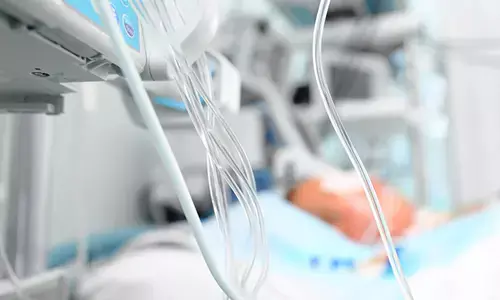- Home
- Medical news & Guidelines
- Anesthesiology
- Cardiology and CTVS
- Critical Care
- Dentistry
- Dermatology
- Diabetes and Endocrinology
- ENT
- Gastroenterology
- Medicine
- Nephrology
- Neurology
- Obstretics-Gynaecology
- Oncology
- Ophthalmology
- Orthopaedics
- Pediatrics-Neonatology
- Psychiatry
- Pulmonology
- Radiology
- Surgery
- Urology
- Laboratory Medicine
- Diet
- Nursing
- Paramedical
- Physiotherapy
- Health news
- Fact Check
- Bone Health Fact Check
- Brain Health Fact Check
- Cancer Related Fact Check
- Child Care Fact Check
- Dental and oral health fact check
- Diabetes and metabolic health fact check
- Diet and Nutrition Fact Check
- Eye and ENT Care Fact Check
- Fitness fact check
- Gut health fact check
- Heart health fact check
- Kidney health fact check
- Medical education fact check
- Men's health fact check
- Respiratory fact check
- Skin and hair care fact check
- Vaccine and Immunization fact check
- Women's health fact check
- AYUSH
- State News
- Andaman and Nicobar Islands
- Andhra Pradesh
- Arunachal Pradesh
- Assam
- Bihar
- Chandigarh
- Chattisgarh
- Dadra and Nagar Haveli
- Daman and Diu
- Delhi
- Goa
- Gujarat
- Haryana
- Himachal Pradesh
- Jammu & Kashmir
- Jharkhand
- Karnataka
- Kerala
- Ladakh
- Lakshadweep
- Madhya Pradesh
- Maharashtra
- Manipur
- Meghalaya
- Mizoram
- Nagaland
- Odisha
- Puducherry
- Punjab
- Rajasthan
- Sikkim
- Tamil Nadu
- Telangana
- Tripura
- Uttar Pradesh
- Uttrakhand
- West Bengal
- Medical Education
- Industry
Steps to reduce deaths from critical illness in COVID times: Consensus among global clinical experts

Sweden: A recent study, published in the journal BMJ Global Health, provides a blueprint for hospitals on how to reduce deaths from critical illness, including from COVID-19.
Critical illness results in millions of deaths worldwide, every year. Critical illness occurs when a patient's vital organs become dysfunctional and there is a risk of imminent death. In critical illness, the patient's airways, breathing, or circulation may become compromised and early identification of the problem and timely care can be lifesaving. Unfortunately, the basic, life-saving care of critically ill patients is often overlooked in health systems, resulting in more deaths from the critical illness that otherwise could have been prevented.
Essential Emergency and Critical Care (EECC) has been devised as the care that every critically ill patient should receive in all hospitals in the world. EECC includes the effective care of low cost and low complexity for the identification and treatment of critically ill patients across all medical specialties.
The study conducted by a group of clinicians and scientists, led by researchers at Karolinska Institutet, Ifakara Health Institute in Tanzania, and the London School of Hygiene & Tropical Medicine (LSHTM) aimed to specify the content of EECC and additionally, given the surge of critical illness in the ongoing pandemic, the essential diagnosis-specific care for critically ill patients with COVID-19.
Examples of what EECC includes are:
- The identification of critical illness by regular assessment of vital signs, such as pulse rate, oxygen saturation, and blood pressure.
- The care of patients with a threatened airway, difficulty breathing, compromised circulation or a reduced level of consciousness using simple things like body positioning, oxygen therapy, and intravenous fluids.
- General processes aimed at facilitating a safe and functioning workflow, for example, communication practices and separation of patients with contagious diseases.
- A list of items (equipment, consumables, drugs, training, infrastructure, and more) needed for a hospital to be ready to identify and care for critically ill patients.
- A special section on how to care for critically ill COVID-19 patients, including the frequent monitoring of oxygen saturation and use of heparin and corticosteroids.
"The findings can be used across medical specialties in hospitals worldwide to prioritize and implement essential care for reducing preventable deaths," wrote the authors. "
Critical Care and COVID-19
Critical illness is common throughout the world and COVID-19 has caused a global surge of critically ill patients. "The COVID-19 pandemic has brought into focus the importance of care of critically ill patients. If all hospitals in the world were enabled to provide EECC to all their critically ill patients, many lives could be saved, both during the pandemic and afterwards," says Tim Baker, associate professor at the Department of Global Public Health, Karolinska Institutet, Ifakara Health Institute and LSHTM.
Reference:
Schell CO, Khalid K, Wharton-Smith A The EECC Collaborators, et alEssential Emergency and Critical Care: a consensus among global clinical expertsBMJ Global Health 2021;6:e006585.
Dr Kamal Kant Kohli-MBBS, DTCD- a chest specialist with more than 30 years of practice and a flair for writing clinical articles, Dr Kamal Kant Kohli joined Medical Dialogues as a Chief Editor of Medical News. Besides writing articles, as an editor, he proofreads and verifies all the medical content published on Medical Dialogues including those coming from journals, studies,medical conferences,guidelines etc. Email: drkohli@medicaldialogues.in. Contact no. 011-43720751


